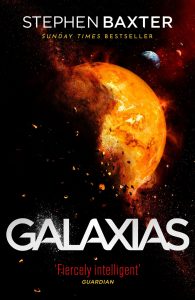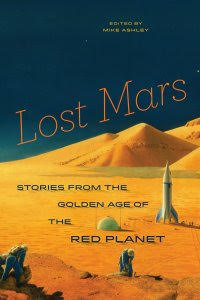Russell Letson Reviews Galaxias by Stephen Baxter
 Galaxias, Stephen Baxter (Gollancz 978-1473228856, $26.99, 538 pp, hc) May 2022.
Galaxias, Stephen Baxter (Gollancz 978-1473228856, $26.99, 538 pp, hc) May 2022.
Stephen Baxter’s Galaxias poses an interesting case of the Spoiler Problem. The publisher’s promotional Tweet offers a dramatic teaser: ‘‘What would happen to the world if the sun went out? The end is nigh. Someone has sent us a sign.’’ And indeed the opening chapters describe the sudden disappearance of the sun at the moment of totality of a solar eclipse in January 2057. But 24 hours (and just over 100 pages) later, the end of the world is postponed when the sun reappears in its proper place, which makes this novella-length section just the first movement in a much longer and more complex account of the effects of that vanishing and the process by which humans begin to work out what it might mean.
I could not review the book without revealing that first-section climax. In any case, it doesn’t spoil the story, because while Galaxias is about what happens after the Blink, as the solar disappearance and return comes to be called – it is only the overture to other matters that are the meat of the novel, which add to the disaster scenario large doses of hard-SF-engineering, political maneuvering, and a Stapledonian-cosmic vision of the place of intelligent life in the universe.
Those initial chapters depict 24 hours of frantic hypothesizing, calculating, modeling possibilities, and eliminating impossibilities. Has the sun been obscured or physically moved? What do the observed optical and gravitational effects suggest? What natural phenomenon could be responsible? Even before the sun returns to its appointed place, the sharpest minds have engaged in textbook hard-SF speculative thinking and decided that this is not a natural occurrence.
Some of us have been calling this out since Blink Day. The surgical precision of the removal of the Sun. The eclipse timing. These are all hallmarks of intelligence – and signals aimed at intelligences on Earth, us.
The additional inference is that this intelligence must have vast – in fact, galaxy-wide – powers, so they call it ‘‘Galaxias.’’ The questions are not only What or Who has been watching us for a very long time, but, especially after the return of our star, Why?
Those are not the only matters treated in the rest of the novel. After the Blink, conditions do not return to normal, despite the restoration of sunlight. Planetary orbits have changed, the moon now rotates, and the Earth itself has been shaken up, its atmosphere and oceans roiled, even its molten core affected. These changes bring new disturbances to the global climate, to tides, to the atmosphere, to the structural balance of the Earth itself: ‘‘Air, oceans, the liquid rock under the crust, even the planet’s iron core, all were sloshing, sloshing.’’ And that means more misery for a world still recovering from decades of damage and disorder caused by climate change, which have also remixed the planet’s geopolitics: a fractured and no longer united United States, a United Kingdom transformed as the English Federation, and a China economically and technologically more potent than any other single nation.
The main story runs from 2057 to 2069, seen through the eyes of three friends who have remained close since university days. The In-Jokes, as they call themselves, are well-positioned to witness the Blink and the whole range of efforts to understand it and cope with its long-term effects. Tash Brand is a junior staffer in the office of the English government’s science minister; Mel Kapur is an astronomer and protégé of the Astronomer Royal; and Wu Zhi is an astronaut-scientist, an employee of space-technology giant Jones, Inc. and son of a senior Chinese scientist. Together they take part in the scientific, political, and technological-engineering activities set off by the Blink.
The story line is busy, setting the world-wide material crises initiated by the Blink against the larger cosmological and speculative-technology riddles it raises, with the perspective shuttling between the immediate and the ultimate – how do we survive the period of global readjustment and how do we react to whatever it is that Galaxias is saying to us? (Which appears to be Don’t, though Don’t What is unclear.) The immediate part amounts to a whole library of disaster scenarios, generally revealed not in giant special-effects sequences but in what the In-Jokes encounter in the course of their work: cold summers, super-storms, skies littered with volcanic ash, electronic communications disrupted, sunburn danger thanks to a damaged ozone layer. The ultimate side starts with speculations about the powers and motives of hypothetical aliens and proceeds to some ambitious spaceborne projects – which, if the Blink was a warning, might also be risky.
And everything gets an explanatory passage, whether it’s Kardashev-scale galactic civilizations, dark energy, plate tectonics, vulcanism, weather systems, solar storms, or the dynamics of staff meetings. The result is a narrative with as much explanation as event, which in turn had me wondering about the audience implied by such a mix of drama and talk. But then, hard science fiction has a tendency toward the procedural and the explanatory. The book’s thinking-through of the events and machineries of its densely imagined world is thorough and convincing – but it does not always make for a fleet footed story line. For example, a three-page passage describes an Earth-Moon trip, with information about the single-stage-to-orbit spaceplane and the rest of the transit system. I kept thinking of the PanAm spaceliner sequence of 2001 in which a Velcro-shod flight attendant snags a floating pen and returns it to the sleeping passenger’s pocket: the function of those details in the film’s larger story and imaginative space and what the scene assumes about the audience’s understanding of zero-gee conditions.
All the same, I was pulled through the staff meetings and infodumps and informational conversations by the usual virtues: I wanted to see questions answered and problems solved, and those answers and resolutions are delivered quite satisfactorily. And while their fates do not matter greatly in the cosmic scheme that frames the story, it was also satisfying to see what the Blink does to the lives of Tash, Mel, Wu Zhi, and their families and colleagues, who provide a human anchor point when the camera pulls back to view that Stapledonian ocean.
This review and more like it in the March 2022 issue of Locus.
 While you are here, please take a moment to support Locus with a one-time or recurring donation. We rely on reader donations to keep the magazine and site going, and would like to keep the site paywall free, but WE NEED YOUR FINANCIAL SUPPORT to continue quality coverage of the science fiction and fantasy field.
While you are here, please take a moment to support Locus with a one-time or recurring donation. We rely on reader donations to keep the magazine and site going, and would like to keep the site paywall free, but WE NEED YOUR FINANCIAL SUPPORT to continue quality coverage of the science fiction and fantasy field.
©Locus Magazine. Copyrighted material may not be republished without permission of LSFF.








